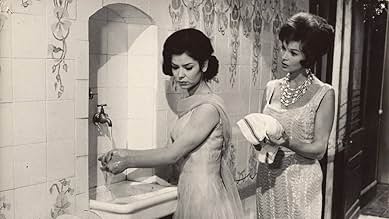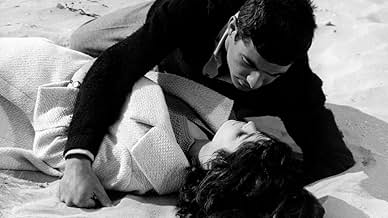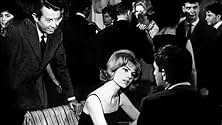Éducation sentimentale
- 1962
- Tous publics
- 1h 32min
NOTE IMDb
5,9/10
178
MA NOTE
Frédéric Moreau, jeune provincial d'origine modeste va vivre à Paris et se fait héberger par de riches cousins: les Dambreuse. Frédéric fait la rencontre d'Anne, une jeune bourgeoise mariée ... Tout lireFrédéric Moreau, jeune provincial d'origine modeste va vivre à Paris et se fait héberger par de riches cousins: les Dambreuse. Frédéric fait la rencontre d'Anne, une jeune bourgeoise mariée à un époux infidèle, dont il tombe amoureux.Frédéric Moreau, jeune provincial d'origine modeste va vivre à Paris et se fait héberger par de riches cousins: les Dambreuse. Frédéric fait la rencontre d'Anne, une jeune bourgeoise mariée à un époux infidèle, dont il tombe amoureux.
- Réalisation
- Scénario
- Casting principal
Avis à la une
Alexandre Astruc ditches his former "camera pen " style which spawned memorable efforts such as D'Aurevilly's "Le Rideau Cramoisi" and Maupassant's "Une Vie" . "Education Sentimentale" finds the director succumbing to the Nouvelle Vague vices :hollow characters, loose screenplay ,"deep" "serious" "meaningful " conversations,self-centered persons who do not even realize there is a world outside.
Freely adapted from Gustave Flaubert ,Astruc -who brilliantly succeeded in adapting Maupassant - made the same mistake as Vadim filming "Les Liaisons Dangereuses" :transposing a work from another century to his era .In the sixties ,a story which was absorbing one hundred years before may become banal ,as common as any (platonic or not)adulterous relations .
Well acted by Brialy,Auclair and Nat,but it is not enough ;it's boring.
Freely adapted from Gustave Flaubert ,Astruc -who brilliantly succeeded in adapting Maupassant - made the same mistake as Vadim filming "Les Liaisons Dangereuses" :transposing a work from another century to his era .In the sixties ,a story which was absorbing one hundred years before may become banal ,as common as any (platonic or not)adulterous relations .
Well acted by Brialy,Auclair and Nat,but it is not enough ;it's boring.
I haven't read the Flaubert book in which this movie was is based on but i believe this will not affect my judgement since it was made by Alexandre Astruc, one of the critics in the now famous cahier du cinema, and therefore a supporter of the whole autheurism thing.
Anyway, i was kind of surprised to see how banal and frankly boring this one was. There is a general distrust towards the bourgeoisie to be seen in this, but it is made in such a romantic way that it loses all of its potential edge. Actually the whole film is quite romantic. We have the undecided woman that needs to be saved from her oppressive life and husband ( actually all women in this one fit into some pre established archetype of women, so we have the woman who does not know what she wants that i have mentioned above, we have the clingy and needy model who needs anyone who treat her mildly seriously,etc.), we have the good young, sensitive man that is dying to do it for her. Jean Claude Brialy is portrayed essentially as a knight in shining armor ( except for the fact that he slaps women across the face).
In summary, the plot is not that well transcribed into the post modern world, the characters come out a bit shallow and the conflicts, to me at least, seem very easy to solve. Also, the beginning of the film is really confusing, there are a ton of characters and we never really get a proper introduction to a large portion of them. Also also whatever happened to Barbara? she just sort of disappeared halfway through. I would've liked to see more of her.
I know that nouvelle vague is far from a homogeneous movement, but still, this one stands out a lot and to me looks a lot like what Truffaut used to call "cinéma de papa"
The beginning of the film is most confusing, there are a ton of characters and we never really get a proper introduction to them. Barbara just disappears halfway through. I would've liked to see more of her. I know that nouvelle vague is far from a homogeneous movement, but still, this one stands out a lot and to me looks a lot like what Truffaut used to call "cinéma de papa"
It is a film for Jean Claude Brialy , Dawn Addams and Marie Jose Nat , not for the Flaubert novel as source. Alexandre Astruc ditches his former "camera pen " style which spawned memorable efforts such as D'Aurevilly's "Le Rideau Cramoisi" and Maupassant's "Une Vie" . "Education Sentimentale" finds the director succumbing to the Nouvelle Vague vices: hollow characters, loose screenplay ,"deep" "serious" "meaningful " conversations,self-centered persons who do not even realize there is a world outside. Stupidly adapted from Gustave Flaubert , Astruc made the same mistake as Vadim filming "Les Liaisons Dangereuses" :transposing a work from another century to his era . In the sixties , a story which was absorbing one hundred years before may become banal ,as common as any (platonic or not) adulterous relations . Ill acted by Brialy, Auclair and Nat, but, it's boooooooring. I have read the Flaubert book. It is a masterpiece. But of course Astruc was a supporter of the autheurism concept thing. Anyway, I was hardly surprised to see how banal and boring this ambition was. There is of course a general distrust towards the bourgeoisie to be seen here , but no potential edge. Actually the whole film is anodine. We have the undecided woman that needs to be saved from her oppressive life and husband, we have the clingy and needy model who needs anyone who treat her mildly seriously, we have the good young, sensitive man that is dying to do it for her. Come on...
After decades, it is a film easy to see more for Jean Claude Brialy , Dawn Addams and Marie Jose Nat than for the Flaubert novel as source. A film about loneliness, love, intrigues, illusions, duty, keeping all the flavors of its time , seeming very simplistic and unrealistic, remaining charming not only for nostalgics, for a sort of innocence and XIX atmosphere, for well manner to remind the fragility of relations.. A beautiful adaptation with purpoise of past travel.
The funniest nickname I found in the biographies of Alexandre Astruc, the director of 'Sentimental Education' (1962) is 'Uncle of the New French Wave'. This characterization is based on the theoretical writings that Astruc left behind. One of the most famous dates from 1948 and precedes the articles in 'Cahiers du Cinema' by a few years, referring to the camera as a creative tool of directors similar to the pen for writers. Astruc put on paper an idea that would later be developed into the concept of 'author film'. In the following years he would set up the film club 'Objectif49' and the 'Festival du Film Maudit', collaborate with 'Cahiers du Cinema' and start making films to put his theories into practice. But unlike his younger colleagues Truffaut, Godard, Chabrol or Rohmer, success has eluded him. 'Éducation sentimentale' (the English title is 'Lessons in Love') is one of his last feature films and the last one that matters. It is, in my opinion, a film with many interesting elements, which passes the test of time well, and whose underrating can be explained especially in comparison with the successes and courage of his colleagues and rivals to push the experiments further.
'Éducation sentimentale' is defined as being inspired by the novel of the same name, the second famous of Gustave Flaubert. The writers used the characters of the book, but they completely changed the social environment and the time in which the story takes place, one could even say that they changed them from one pole to another. Flaubert's novel took place during the revolutionary movements of 1848, while the film places its action in the contemporaneity of its realization, that is, in the early 1960s. In other words, from the period of the rise and consolidation of the bourgeoisie to the twilight period of this class, as it was perceived in France immediately before 1968. It is a kind of oblique critique of the morals of the great French bourgeoisie, interested only in its own financial interests, decadent in morals and stifling genuine feelings. This is the environment in which the young Frederic Moreau (Jean-Claude Brialy), returning from Algeria, is taken under the protection of the family of the industrialist Dambreuse, makes his professional apprenticeship with him, and falls in love with Anne Arnoux (Marie-José Nat), a friend of the family, married to a corrupt manager. Swinging between three women, one with whom he is in love, another who is in love with him, and the third with whom he has casual relationships, the handsome and talented young man will complete his sentimental education at the risk of beimg left lonely in world where most relationships are intended for immediate pleasure or interest.
The film takes off clumsily, the characters seem to go straight into the action and are not well introduced. The filmmakers may have relied on the fact that viewers know the novel, but this is not true for non-French audiences. But once we understand the relationships between the characters, the story becomes clear and catchy. Alexandre Astruc uses an intriguing cinematic method. The scenes inside are filmed in a fairly conventional style, the ones that directors of the New Wave called 'cinema du papa'. When the heroes and the camera go outside, we are dealing with the characteristic freedom of the 'Nouvelle Vague', mobility, direct sound recordings, and many American cars (as the 'Nouvel Chic' style was knocking on the door). Marie-José Nat, a beautiful and intelligent actress, plays an excellent role of a sensitive and vulnerable woman, who has to decide between love and marital duty, between feelings and social conventions. Jean-Claude Brialy convinced me less, he is too immobile, without conveying feelings. It's a role like the ones played by Alain Delon, but his silences were much more significant. I also liked the soundtrack and the black and white cinema - expressive and fluid, especially in the outdoor scenes. 'Éducation sentimentale' is definitely an interesting film by a director who, in my opinion, gave up too early.
'Éducation sentimentale' is defined as being inspired by the novel of the same name, the second famous of Gustave Flaubert. The writers used the characters of the book, but they completely changed the social environment and the time in which the story takes place, one could even say that they changed them from one pole to another. Flaubert's novel took place during the revolutionary movements of 1848, while the film places its action in the contemporaneity of its realization, that is, in the early 1960s. In other words, from the period of the rise and consolidation of the bourgeoisie to the twilight period of this class, as it was perceived in France immediately before 1968. It is a kind of oblique critique of the morals of the great French bourgeoisie, interested only in its own financial interests, decadent in morals and stifling genuine feelings. This is the environment in which the young Frederic Moreau (Jean-Claude Brialy), returning from Algeria, is taken under the protection of the family of the industrialist Dambreuse, makes his professional apprenticeship with him, and falls in love with Anne Arnoux (Marie-José Nat), a friend of the family, married to a corrupt manager. Swinging between three women, one with whom he is in love, another who is in love with him, and the third with whom he has casual relationships, the handsome and talented young man will complete his sentimental education at the risk of beimg left lonely in world where most relationships are intended for immediate pleasure or interest.
The film takes off clumsily, the characters seem to go straight into the action and are not well introduced. The filmmakers may have relied on the fact that viewers know the novel, but this is not true for non-French audiences. But once we understand the relationships between the characters, the story becomes clear and catchy. Alexandre Astruc uses an intriguing cinematic method. The scenes inside are filmed in a fairly conventional style, the ones that directors of the New Wave called 'cinema du papa'. When the heroes and the camera go outside, we are dealing with the characteristic freedom of the 'Nouvelle Vague', mobility, direct sound recordings, and many American cars (as the 'Nouvel Chic' style was knocking on the door). Marie-José Nat, a beautiful and intelligent actress, plays an excellent role of a sensitive and vulnerable woman, who has to decide between love and marital duty, between feelings and social conventions. Jean-Claude Brialy convinced me less, he is too immobile, without conveying feelings. It's a role like the ones played by Alain Delon, but his silences were much more significant. I also liked the soundtrack and the black and white cinema - expressive and fluid, especially in the outdoor scenes. 'Éducation sentimentale' is definitely an interesting film by a director who, in my opinion, gave up too early.
Le saviez-vous
- AnecdotesItalian censorship visa # 37143 dated April 13th 1962
- ConnexionsReferenced in Les échos du cinéma: Épisode #1.53 (1961)
Meilleurs choix
Connectez-vous pour évaluer et suivre la liste de favoris afin de recevoir des recommandations personnalisées
Détails
- Date de sortie
- Pays d’origine
- Sites officiels
- Langue
- Aussi connu sous le nom de
- L'éducation sentimentale
- Lieux de tournage
- Sociétés de production
- Voir plus de crédits d'entreprise sur IMDbPro
- Durée1 heure 32 minutes
- Couleur
- Mixage
- Rapport de forme
- 2.35 : 1
Contribuer à cette page
Suggérer une modification ou ajouter du contenu manquant

Lacune principale
What is the English language plot outline for Éducation sentimentale (1962)?
Répondre















